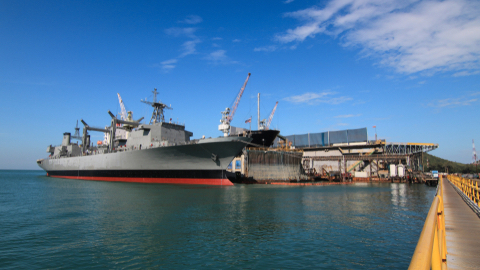
The US Navy has awarded Ameresco a task order for a $58 million energy resilience project at the Portsmouth Naval Shipyard (PNSY). Ameresco will build upon existing infrastructure to provide a high level of redundancy for mission-critical loads.
Ameresco will provide on-site generation, battery storage, and microgrid controls via an energy savings performance contract. The microgrid and other energy improvements are expected to save the Navy $175 million over the 22-year performance term and improve the facility’s energy security.
The project includes:
- A new 7.5 MW combined heat and power (CHP) plant, which expands upon an existing 14 MW CHP power plant at the site;
- a 1 MW/2 MWh battery energy storage;
- an expanded microgrid with intelligent controls and fast load shed capability;
- upgrades to the site’s electrical distribution system; and,
- a new 800 HP steam-turbine driven air compressor.
The microgrid control system will continuously monitor and intelligently dispatch on-site generation assets and imported power. The new CHP plant will provide resilience steam supply and the steam-turbine driven air compressor will serve the shipyard’s industrial compressed air loads, using “free” co-generated steam from the plant as opposed to electricity purchased from the grid. All measures are designed to operate in compliance with the Department of Defense and Navy cybersecurity requirements.
Ameresco expects to complete construction in 2022 and, after construction is completed, will operate and maintain ESPC-delivered systems until January 2044.
“By extending our partnership with PNSY to increase on-site generation, deploy energy storage, and integrate a broad range of generation assets into a fully independent microgrid, we will ensure that the shipyard is able to continue providing high-quality service to Navy’s fleet,” said Nicole Bulgarino, executive vice president and general manager of federal solutions at Ameresco. “This project builds on our decades-long partnership with PNSY to assure the shipyard’s vital national security mission, even in the event of a prolonged loss of utility.”
